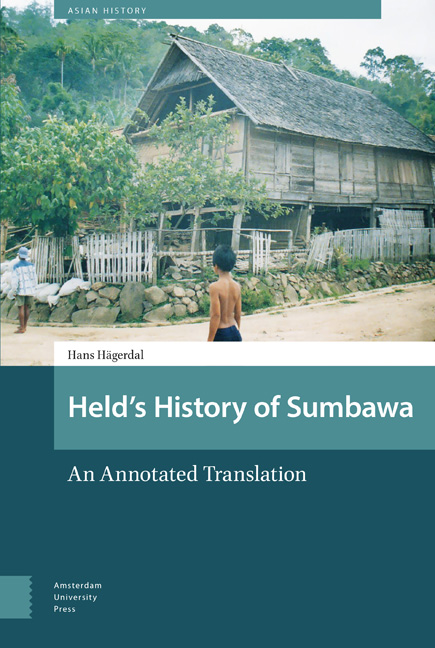Book contents
- Frontmatter
- Contents
- List of Figures and Tables
- Map
- Translator’s Introduction
- 1 The Ancient Period
- 2 Islam and Makassar
- 3 The Sumbawan Kingdoms under VOC Suzerainty (1)
- 4 The Sumbawan Kingdoms under VOC Suzerainty (2)
- 5 In the Wake of the Tambora Disaster
- 6 From Colonial rule to Independence
- Appendix: Lists of Sumbawan Rulers
- Bibliograph
- Index
2 - Islam and Makassar
Published online by Cambridge University Press: 10 December 2020
- Frontmatter
- Contents
- List of Figures and Tables
- Map
- Translator’s Introduction
- 1 The Ancient Period
- 2 Islam and Makassar
- 3 The Sumbawan Kingdoms under VOC Suzerainty (1)
- 4 The Sumbawan Kingdoms under VOC Suzerainty (2)
- 5 In the Wake of the Tambora Disaster
- 6 From Colonial rule to Independence
- Appendix: Lists of Sumbawan Rulers
- Bibliograph
- Index
Summary
[Alauddin conquers Sumbawa in 1626]
From the diary of Gowa it appears that the conquest of Sumbawa by Sultan Alauddin of Gowa took place between 1616 and 1626. How, exactly, this was done does not appear from the brief diary notes, but it did not happen without resistance on the part of Sumbawa. Thus the diary notes on 13 November 1633: ‘It is said that the Bimanese have rebelled.’ Then follows a remark on 25 November: ‘Karaeng-ri-Burane departs for Bima in order to fight the rebels’, followed by a final note on 7 April 1633: ‘Karaeng-ri-Burane comes back from Bima’, and on 21 June 1633: ‘The Bimanese themselves are coming. The king speaks; they agree.’
[Violent action by Gowa in 1632]
In this case we know from the Daghregister how we should read these lapidary notices:
The 23rd [of May 1633] the ship Brouwershaven returns hither from Bima, and brings [on 24 January 1633] its accompanying cargo back unused, since no trade has been possible to carry out there or in the areas around there, because on their arrival all the rice was out and all the negrijs of Bima were burnt, exterminated and destroyed and the whole land was ravaged by the Makassarese armada, the strength of which was about 400 ships and several thousand men who were present in Bima, hurriedly sent there by the King of Makassar in order to reinstate the King of Bima, his brother-in-law, in his land, as he had been expelled by his subjects (who rebelled against him) and brought to the island Gounong Apij, situated close to Bijma.
At the arrival of the said armada the rebellious inhabitants of Bima all fled to the mountains, without having … come back when the ship Brouwershaven departed from there; he assured, however, that after the departing of the Makassarese who were constantly around them, he did not dare display the missive of Mr. General or permit any trade without the license of the King of Makassar (under whom he and the whole Island of Cumbawa were subjected).
- Type
- Chapter
- Information
- Held's History of SumbawaAn Annotated Translation, pp. 63 - 76Publisher: Amsterdam University PressPrint publication year: 2017



